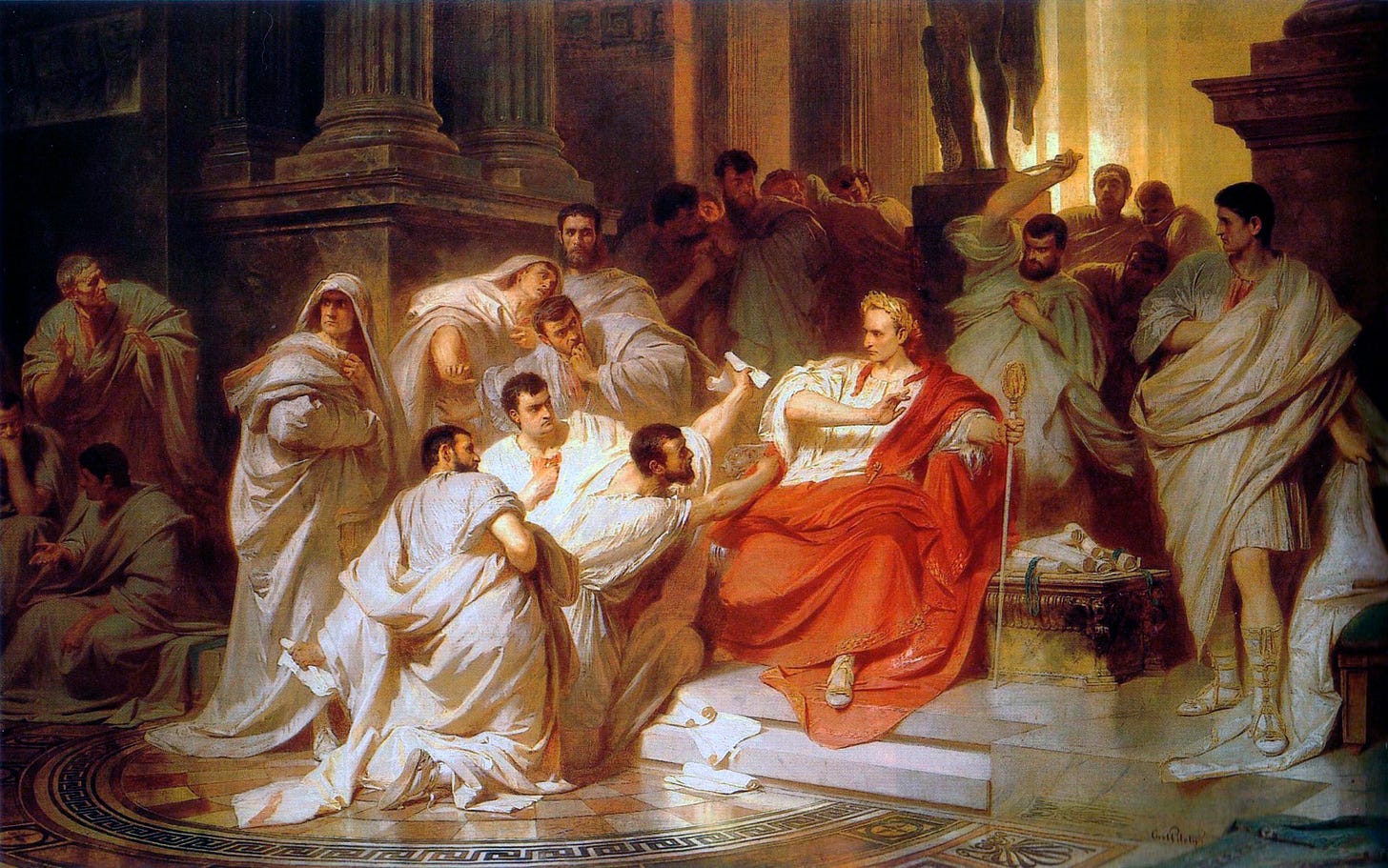Hi there,
This edition covers a story about Julius Caesar’s lasting impact on the world.
Hope you enjoy it,
Let's go
Julius Caesar inspired the titles Kaiser and Tsar
Julius Caesar was one of the greatest military commanders in history. Yes, the same Caesar who was brutally murdered on the Ides of March by Brutus, giving us the famous line etched in the brains of all school kids: "Et tu, Brute?"
His legacy, however, lives on not only in the minds of children but in parts of language as well.

During his time, Caesar was a brilliant general who conquered vast swaths of territory and even squashed a civil war.
Given Caesar's military prowess, his family name "Caesar" was co-opted by his successors as a synonym for emperor.
It was first used by Octavian, the adopted son of Julius Caesar. Octavian transformed the family name into a title to signal his connection to Julius Caesar and to solidify his position as ruler.
Upon gaining control of the Empire, Octavian was given the honorific "Augustus" by the Senate, meaning "illustrious one." Octavian thus became known as Augustus Caesar.
Following in Julius's footsteps, Octavian adopted a boy, Tiberius, and named him his heir, bestowing upon him the title "Caesar."
Thus, a trend was established among the Roman emperors of identifying their successors by bestowing the title "Caesar" on them, a title which they retained after ascending to power.
Spreading to other languages
However, the influence of Caesar's name wasn't confined to just the Romans. It spread across Europe and became part of many languages.
The German language took shape around the second millennium BC in Northern Europe, where different tribes formed a cultural group unified by a similar language.
Over time, they migrated southward and encountered the Romans. The Roman Empire was an advanced civilization by then, and the Germans picked up words from the Latin language which they adopted and modified into German.
The title "Caesar" for the ruler became "Kaiser" in German.1
Kaiser is German for Emperor; in World War I, Kaiser Wilhelm II led the German army and navy.
Similarly, the title Tsar, is a Slavic term derived from the title "Caesar." The first Tsar was Ivan IV, also known as Ivan the Terrible, and the last Tsar was Nicholas II, Commander in Chief of the Army during World War 12.
Caesar's Lasting Impact
Julius Caesar accomplished many incredible feats. He extended Rome's boundaries and introduced the modern calendar—fun fact: July is named in his honor. Following his death, the name of his birth month was changed from Quintilis to Julius. He also helped Cleopatra ascend the throne of Egypt.
Here’s another cool anecdote I came across when researching this piece,
A story from Parallel Lives, Life of Julius Caesar by Plutarch
While on his way to study oratory in Rhodes, 25-year-old Julius Caesar was captured by a band of Cilician pirates in the Aegean Sea.
But, Caesar refused to act like a captive, laughing at the pirates' ransom demand of 20 talents and suggesting that they demand 50 talents instead.
He made himself at home, participating in the pirates' games and exercises, bossing the pirates around, shushing them when he wanted to sleep, making them listen to his speeches, and berating them as illiterates if they weren't sufficiently impressed. From time to time, he would threaten to have them all crucified.
After 38 days, the ransom was paid, and Caesar was freed.
He quickly raised a naval force and captured the pirates. When the Governor of Asia hesitated to punish them, Caesar took matters into his own hands and had them crucified.
According to another source, Caesar slit their throats before crucifixion to spare them a long death, as a mark of his affection for the pirates.
Researching this piece revealed how much of our collective history is both around us and forgotten at the same time.
It was fascinating to see how Caesar's name evolved into titles used by rulers across Europe centuries later.
If you have any interesting anecdotes or stories you think would be worth exploring, please share them in the comments.
Thanks to Joy Bhattacharjya on X for writing about Caesar’s mighty influence on modern languages. Follow him for cool, short, and snappy stories about history’s heroes and heroines.
If you enjoyed this newsletter do consider sharing, liking, or commenting! Preferably all three. Thanks!
Filtered Kapi #58




